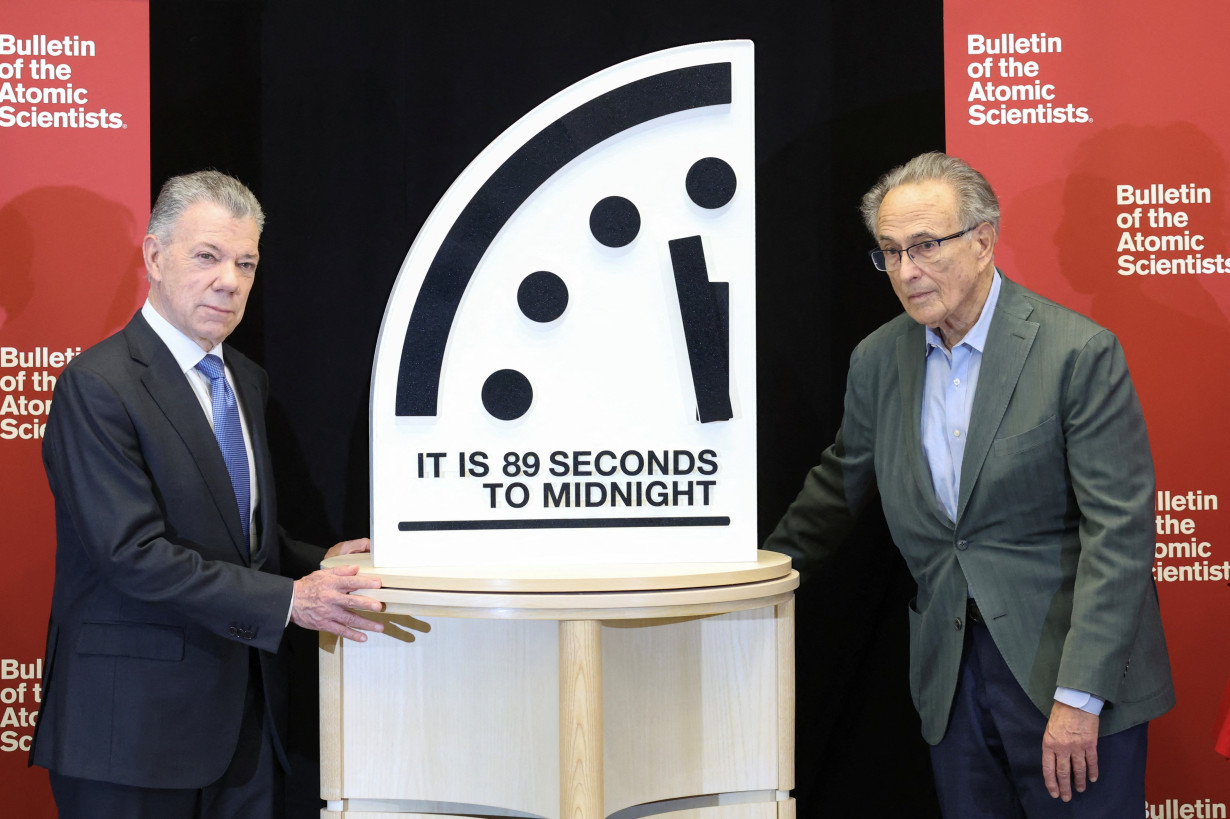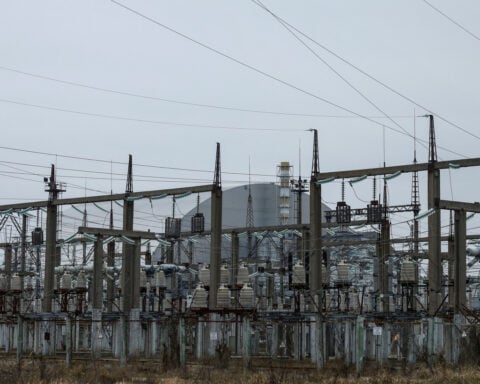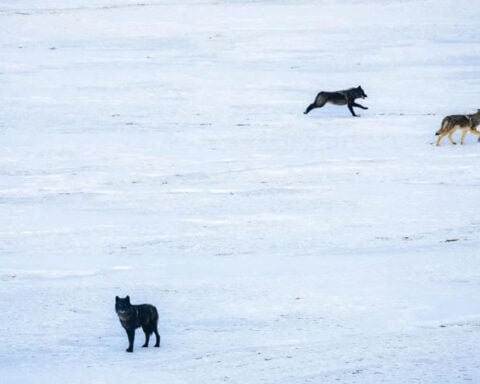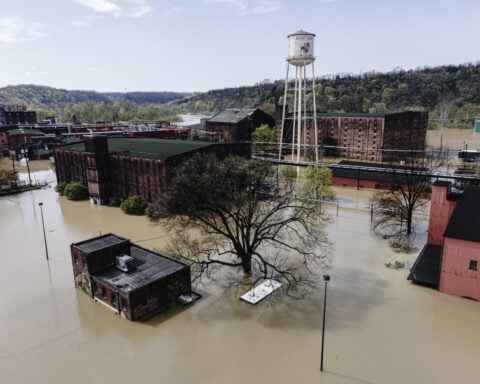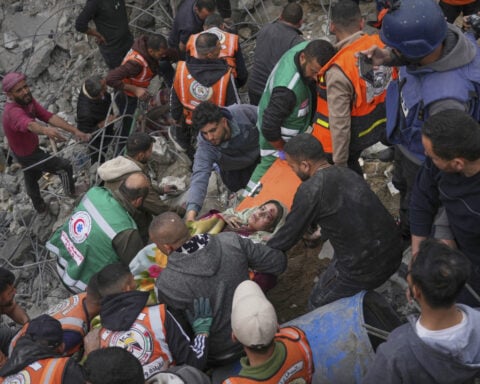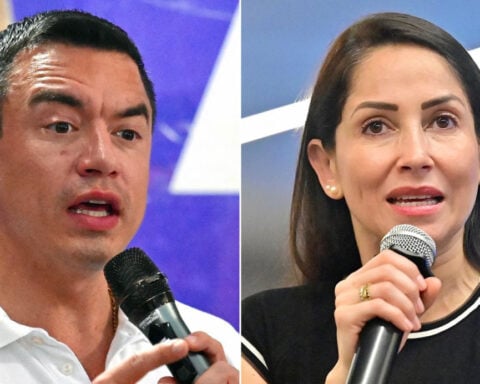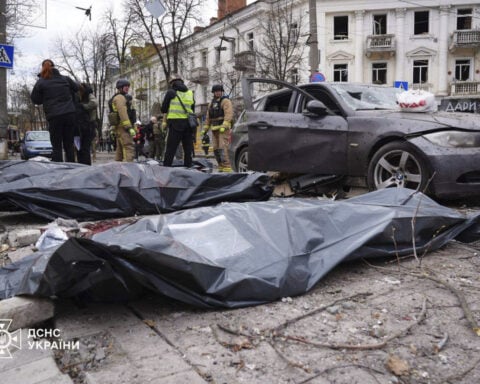By Will Dunham
WASHINGTON (Reuters) - Atomic scientists on Tuesday moved their "Doomsday Clock" closer to midnight than ever before, citing Russian nuclear threats amid its invasion of Ukraine, tensions in other world hot spots, military applications of artificial intelligence and climate change as factors underlying the risks of global catastrophe.
The Bulletin of the Atomic Scientists set the clock to 89 seconds before midnight - the theoretical point of annihilation. That is one second closer than it was set last year. The Chicago-based nonprofit created the clock in 1947 during the Cold War tensions that followed World War Two to warn the public about how close humankind was to destroying the world.
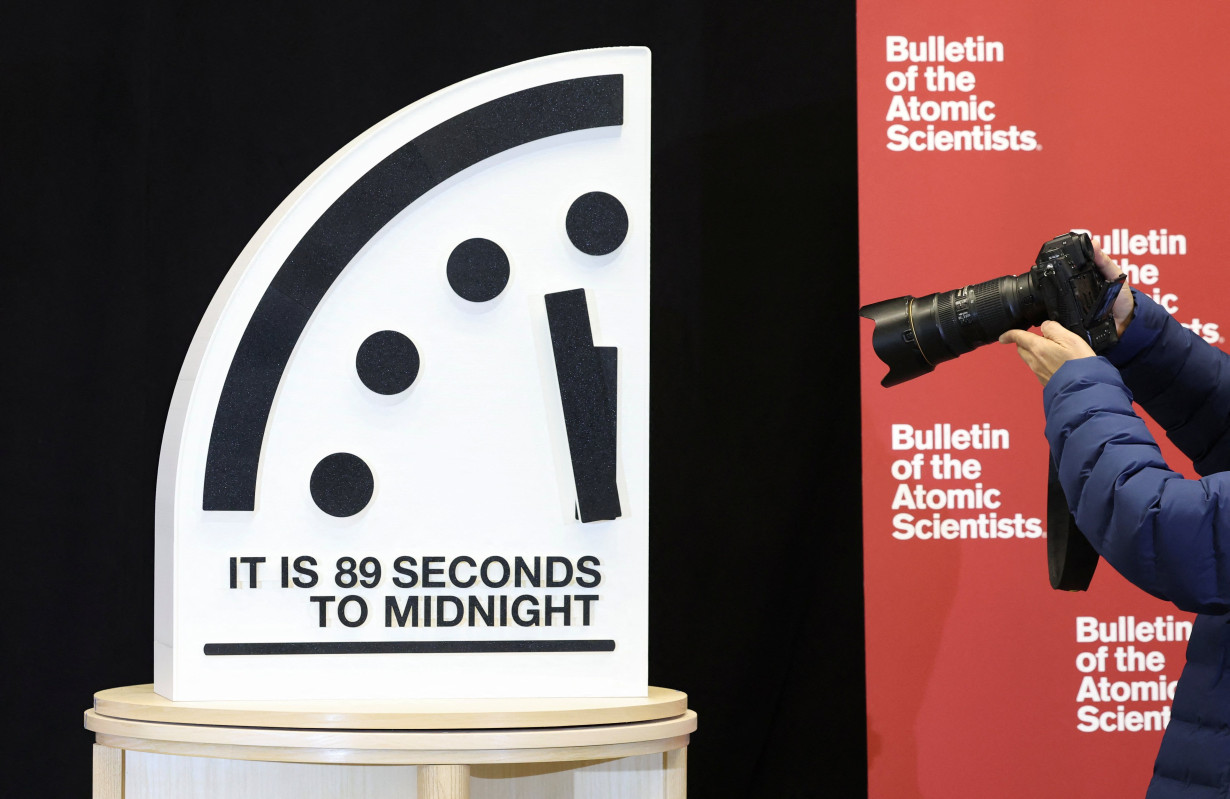
"The factors shaping this year's decision - nuclear risk, climate change, the potential misuse of advances in biological science and a variety of other emerging technologies such as artificial intelligence - were not new in 2024. But we have seen insufficient progress in addressing the key challenges, and in many cases this is leading to increasingly negative and worrisome effects," said Daniel Holz, chair of the Bulletin's Science and Security Board.
"Setting the Doomsday Clock at 89 seconds to midnight is a warning to all world leaders," Holz added.
The organization said the United States, China and Russia have the prime responsibility to pull the world back from the brink, and urged good-faith international dialogue. At a news conference announcing the decision, Nobel Peace Prize Laureate Juan Manuel Santos, Colombia's former president, said, "This is a bleak picture but it is not yet irreversible."
Russia's 2022 invasion of Ukraine launched Europe's bloodiest conflict since World War Two.
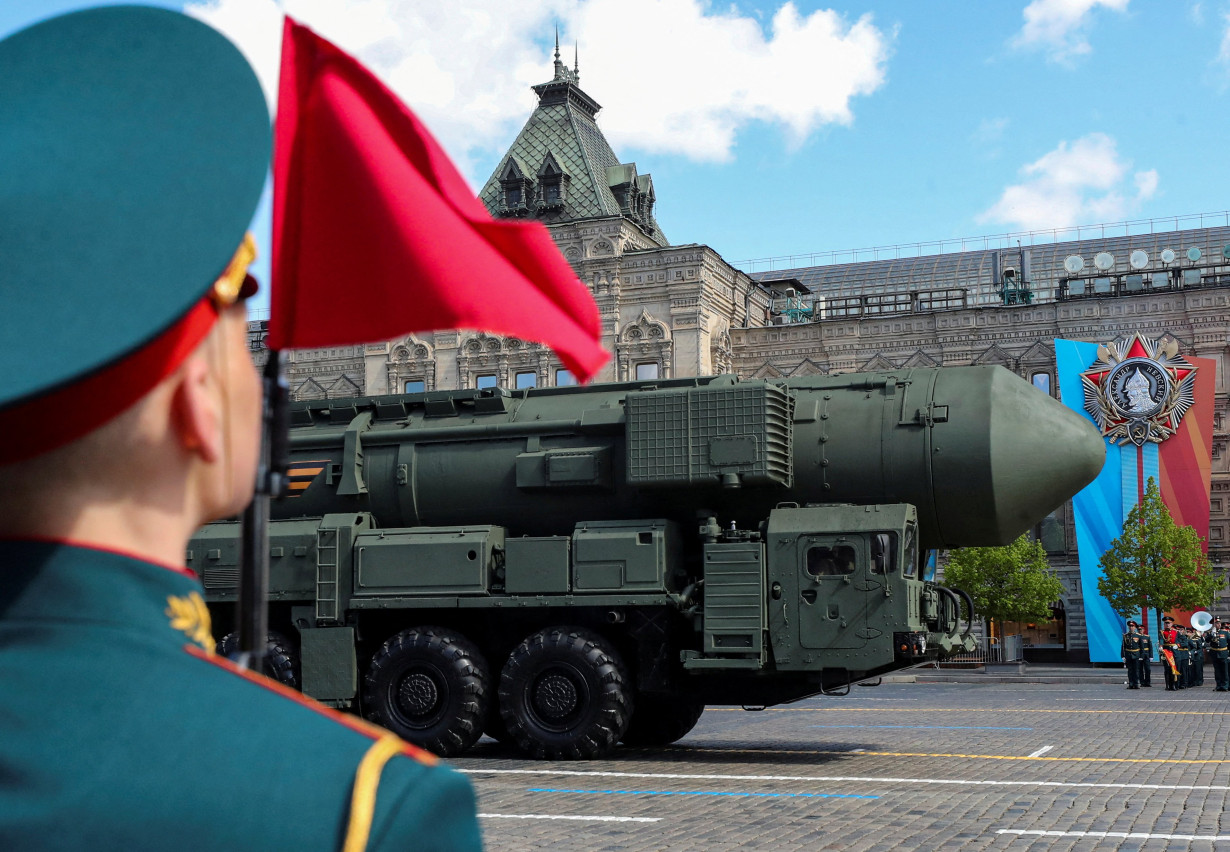
"The war in Ukraine continues to loom as a large source of nuclear risk. That conflict could escalate to include nuclear weapons at any moment due to a rash decision or through accident and miscalculation," Holz said.
Russian President Vladimir Putin in November lowered the threshold for a nuclear strike in response to a broader range of conventional attacks, a move the Kremlin described as a signal to the West amid a war in which Ukraine has received arms supplied by the United States and its allies. Russia's updated doctrine set a framework for conditions under which Putin could order a strike from the world's biggest nuclear arsenal.
Russia said in October it will not discuss signing a new treaty with the United States to replace the New Strategic Arms Reduction Treaty limiting each side's strategic nuclear weapons that expires in 2026 because Moscow believes it must be broadened and expanded to cover other countries.
"Russian aggression in Ukraine, including repeated use of nuclear threats since the war began, has been disturbing. In addition, Russia's recent backtracking from important arms control treaties is an alarming sign of increasing nuclear risk," Holz said.
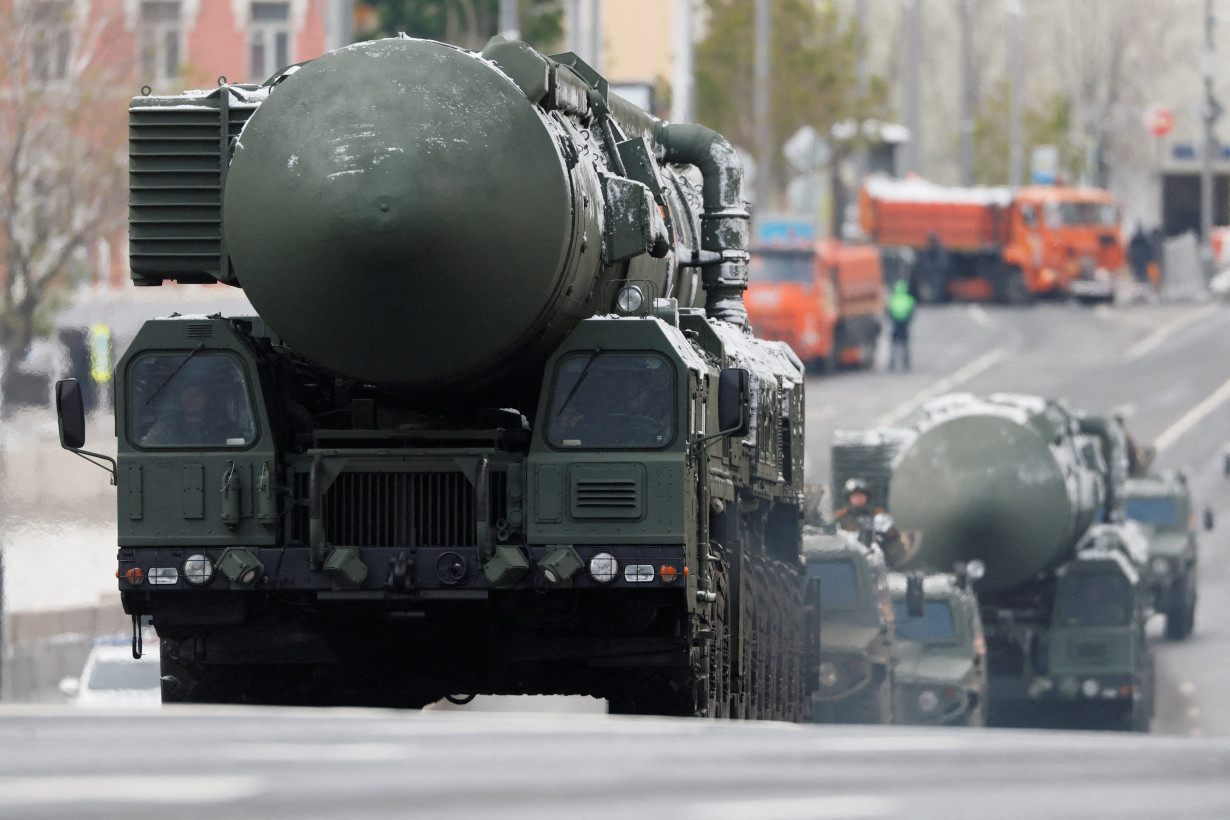
'DANGEROUSLY UNSTABLE'
The Middle East has been another source of instability with the Israel-Gaza war and broader regional hostilities involving countries including Iran. Nuclear-armed China has stepped up military pressure near Taiwan and nuclear-armed North Korea continues testing various ballistic missiles.
"We are watching closely and hope that the ceasefire in Gaza will hold. Tensions in the Middle East including with Iran are still dangerously unstable," Holz said. "There are other potential hot spots around the world, including Taiwan and North Korea. Any of these could turn into a conflagration involving nuclear powers, with unpredictable and potentially devastating outcomes."
Artificial intelligence made rapid gains in capability and popularity in 2024, prompting increasing concern among some experts about its military applications and its risks to global security. In the United States, then-President Joe Biden in October signed an executive order intended to reduce the risks that AI poses to national security, the economy and public health or safety. His successor Donald Trump last week revoked it.
"Advances in AI are beginning to show up on the battlefield in tentative but worrisome ways, and of particular concern is the future possibility of AI applications to nuclear weapons. In addition, AI is increasingly disrupting the world's information ecosystem. AI-fueled disinformation and misinformation will only add to this dysfunction," Holz said.
Last year was the hottest in recorded history, according to the U.N. World Meteorological Organization. Climate change is worsening storms and raising the risk of wildfires, according to scientists.
"While there has been impressive growth in wind and solar energy, the world is still falling short of what is necessary to prevent the worst aspects of climate change," Holz said.
The Bulletin was founded in 1945 by scientists including Albert Einstein and J. Robert Oppenheimer.
(Reporting by Will Dunham; Editing by Daniel Wallis)

 Trump has begun another trade war. Here's a timeline of how we got here
Trump has begun another trade war. Here's a timeline of how we got here
 Canada's leader laments lost friendship with US in town that sheltered stranded Americans after 9/11
Canada's leader laments lost friendship with US in town that sheltered stranded Americans after 9/11
 Chinese EV giant BYD's fourth-quarter profit leaps 73%
Chinese EV giant BYD's fourth-quarter profit leaps 73%
 You're an American in another land? Prepare to talk about the why and how of Trump 2.0
You're an American in another land? Prepare to talk about the why and how of Trump 2.0
 Chalk talk: Star power, top teams and No. 5 seeds headline the women's March Madness Sweet 16
Chalk talk: Star power, top teams and No. 5 seeds headline the women's March Madness Sweet 16
 Purdue returns to Sweet 16 with 76-62 win over McNeese in March Madness
Purdue returns to Sweet 16 with 76-62 win over McNeese in March Madness
